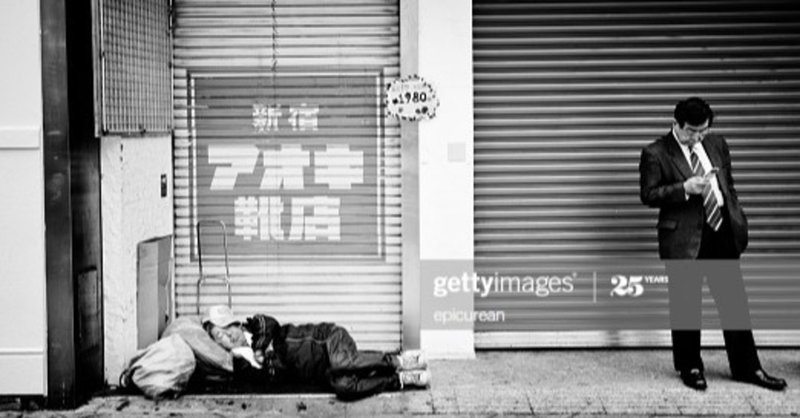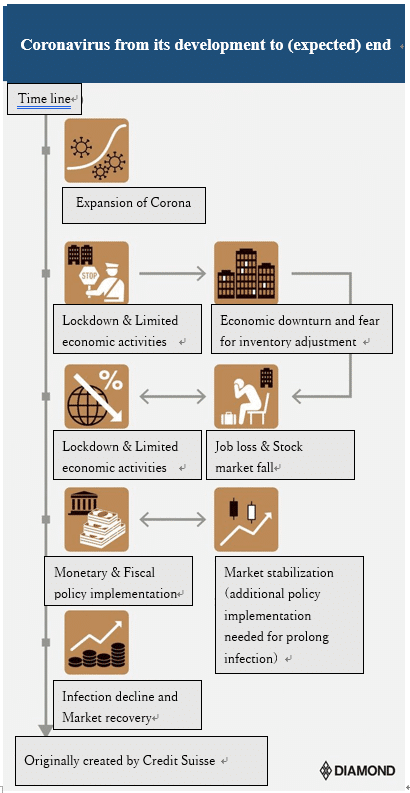
The reasons why Coronavirus affect poor and vulnerable more
Coronavirus is a slow killer in epidemiological and economical terms. It is almost like a biological mine that slowly affects you. New York and New Orleans are the most concerning cities of the United States as they have the highest wealth gap.
Tokyo is no exception. As the government announced the deceleration of the state of emergency, the impact is overwhelming. Many now have limited work hours. Those who used to stay in Comic cafe (known as Manga Kissa) will have to spend a night somewhere else.
In this note, I would like to briefly explain how social determinants of health effects people with lower economic status and how society can respond to protect those who are vulnerable.

■ Three reasons why poor are more likely to be affected
- Unhealthy lifestyle
Many people with lower economic status are prone to have unhealthy diets, smoking habits, and substance dependency as a result of high social anxiety and stress they face every day. Consequently, they are likely to suffer from chronic diseases such as diabetes and high blood pressure. Thus they are more likely to suffer from the infection.
-No or limited access to healthcare
Many people with lower economic status around the world do not have insurance. This prevents people from seeing a doctor earlier stage. One in ten Americans for example, do not have health insurance.
- The work environment that more vulnerable to infection
Food industries, restaurants, and wholesale businesses are often only available jobs for people with lower economic status as they are less trained. They are likely to see an unspecified large number of people in their workplaces. People with lower economic status are more likely to commute to work using public transportation as well. As they have no options but to go to their physical workplace (rather than working remotely), their risk of getting a virus will increase.
Other social determinants affect people with lower economic status.
■ Education
There are more than 1.5 billion children around the world who could not go to school due to Coronavirus. As a consequence of school being closed, a gap between those who have alternative methods of learning (such as attending cram schools or homeschooling) compare to those who have no means of learning will increase. The impact on coronavirus will pass it on to the next generation.
■ Domestic violence
According to the report of Britain, the case of domestic violence increased by 25% as of lock-down. Also, there is 30% increase in domestic violence in both France and Japan. On 7th of April, the first case of death was reported as a result of domestic violence after the Corona outbreak in Tokyo. This is not only limited to adults but also children. More times vulnerable spend inside the house, more likely the chances of abuse. Even though hotels and other means of accommodations are open under the state of emergency or lock-down, those who could not afford to stay in hotels naturally lose their shelters such as restaurants and comic cafes that used to open for 24 hours.
■ Food and security for basic necessities
Though food serving stores remain open, some cannot go out due to physical disability. Some people cannot store food in their homes as they do not have a means of transportation or cars.
■ Discrimination
Those who are vulnerable are likely to suffer from discrimination as a consequence of the coronavirus outbreak. Around the world, some Asian decedents are discriminated against due to their ethnic background. As of Japan, Tokyo metropolitan government mayor called out sex industries as "highly infectious" members. As a consequence sex workers or those who work in related industries may suffer discrimination.
■Media literacy and information
People with lower economic status may have fewer sources of accurate information for coronavirus due to a lack of social capital. Hence those who are vulnerable are likely to be isolated and may have a severe condition as a result.
■ Would cash benefit be enough?
The U.S. is considering cash benefits but 1200 dollars per adult is not enough. Since average rent for cities such as Boston or New York is 2000 dollars. Japan is also considering cash benefits but it will be the only tentative solution to the suffering. As the debate on cash benefit continues today, there are already raised concerns that the Japanese government's cash benefit plan is not fair for those who have lower economic status. The Japanese government decided to pay 30,000 (roughly USD3000) for those households that income has been halved. However, this does not consider per-person income. In another word, if a wife or a child living in the same household as the husband they are not entitled to receive cash benefit even their incomes are halved. Leaving those who had a lower income to start with more vulnerable and less empowered.
■ Unemployment insurance
In Europe, there are providing direct support to those who are in service industries to prevent the rise of unemployment. This incentive is taken to prevent the increase of social problems such as homelessness or substance abuse. Unemployment insurance is a preventative measure.
If we do not do anything to protect those who are most vulnerable, not only people with low social economic status would suffer, but also those who are in higher economic status.
この記事が気に入ったらサポートをしてみませんか?
